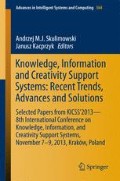Abstract
Standard classification process allocates all processed elements to given classes. Such type of classification assumes that there are only native and no foreign elements, i.e., all processed elements are included in given classes. The quality of standard classification can be measured by two factors: numbers of correctly and incorrectly classified elements, called True Positives and False Positives. Admitting foreign elements in standard classification process increases False Positives and, in this way, deteriorates quality of classification. In this context, it is desired to reject foreign elements, i.e., not to assign them to any of given classes. Rejecting foreign elements will reduce the number of false positives, but can also reject native elements reducing True Positives as side effect. Therefore, it is important to build well-designed rejection, which will reject significant part of foreigners and only few natives. In this paper, evaluations of classification with rejection concepts are presented. Three main models: a classification without rejection, a classification with rejection, and a classification with reclassification are presented. The concepts are illustrated by flexible ensembles of binary classifiers with evaluations of each model. The proposed models can be used, in particular, as classifiers working with noised data, where recognized input is not limited to elements of known classes.
Access this chapter
Tax calculation will be finalised at checkout
Purchases are for personal use only
References
Chang, C.-C., Lin, C.-J.: LIBSVM: a library for support vector machines. ACM Trans. Intell. Syst. Technol. 2, 1–27 (2011)
Chow, C.: On optimum recognition error and reject tradeoff. IEEE Trans. Inf. Theory 16(1), 41–46 (1970)
Fumera, G., Roli, F.: Analysis of error-reject trade-off in linearly combined multiple classifiers. Pattern Recogn. 37, 1245–1265 (2004)
Graves, D., Pedrycz, W.: Kernel-based fuzzy clustering and fuzzy clustering: a comparative experimental study (2010)
Ha, T.M.: Optimum tradeoff between class-selective rejection error and average number of classes. Eng. Appl. Artif. Intell. 10(6), 525–529 (1997)
Ishibuchi, H., Nakashima, T., Morisawa, T.: Voting in fuzzy rule-based systems for pattern classification problems. Fuzzy Sets Syst. 103, 223–238 (1999)
Li, M., Sethi, I.K.: Confidence-based classifier design. Pattern Recogn. 39(7), 1230–1240 (2006)
Lou, Z., Liu, K., Yang, J.Y., Suen, C.Y.: Rejection criteria and pairwise discrimination of handwritten numerals based on structural features. Pattern Anal. Appl. 2(3), 228–238 (1999)
Luckner, M.: Comparison of hierarchical svm structures in letters recognition task. In: Rutkowski, L., Tadeusiewicz, R., Zadeh, L.A., Zurada, J. (eds.) Computational Intelligence: Methods and Applications, pp. 291–302. Challenging Problems of Science, Academic Publishing House EXIT, Warsaw (2008)
Mascarilla, L., Frélicot, C.: Reject strategies driven combination of pattern classifiers. Pattern Anal. Appl. 5(2), 234–243 (2002)
Pierce, S.G., Worden, K., Manson, G.: Evaluation of neural network performance and generalisation using thresholding functions. Neural Comput. Appl. 16, 109–124 (2007)
Pillai, I., Fumera, G., Roli, F.: A classification approach with a reject option for multi-label problems. In: Maino, G., Foresti, G.L. (eds.) ICIAP (1). Lecture Notes in Computer Science, vol. 6978, pp. 98–107. Springer (2011)
Schölkopf, B., et al.: Estimating the support of a high-dimensional distribution. Neural Comput. 13(7), 1443–1471 (2001)
Simeone, P., Marrocco, C., Tortorella, F.: Design of reject rules for ECOC classification systems. Pattern Recogn. 45(2), 863–875 (2012)
Vapnik, V.: Statistical Learning Theory. Wiley, New York (1998)
Xie, J., Qiu, Z., Wu, J.: Bootstrap methods for reject rules of fisher LDA. Pattern Recogn. 425–428 (2006)
Acknowledgments
The research is supported by the National Science Center, grant No 2012/07/B/ST6/01501, decision no UMO-2012/07/B/ST6/01501.
Author information
Authors and Affiliations
Corresponding author
Editor information
Editors and Affiliations
Rights and permissions
Copyright information
© 2016 Springer International Publishing Switzerland
About this paper
Cite this paper
Homenda, W., Luckner, M., Pedrycz, W. (2016). Classification with Rejection: Concepts and Evaluations. In: Skulimowski, A., Kacprzyk, J. (eds) Knowledge, Information and Creativity Support Systems: Recent Trends, Advances and Solutions. Advances in Intelligent Systems and Computing, vol 364. Springer, Cham. https://doi.org/10.1007/978-3-319-19090-7_31
Download citation
DOI: https://doi.org/10.1007/978-3-319-19090-7_31
Published:
Publisher Name: Springer, Cham
Print ISBN: 978-3-319-19089-1
Online ISBN: 978-3-319-19090-7
eBook Packages: Computer ScienceComputer Science (R0)

